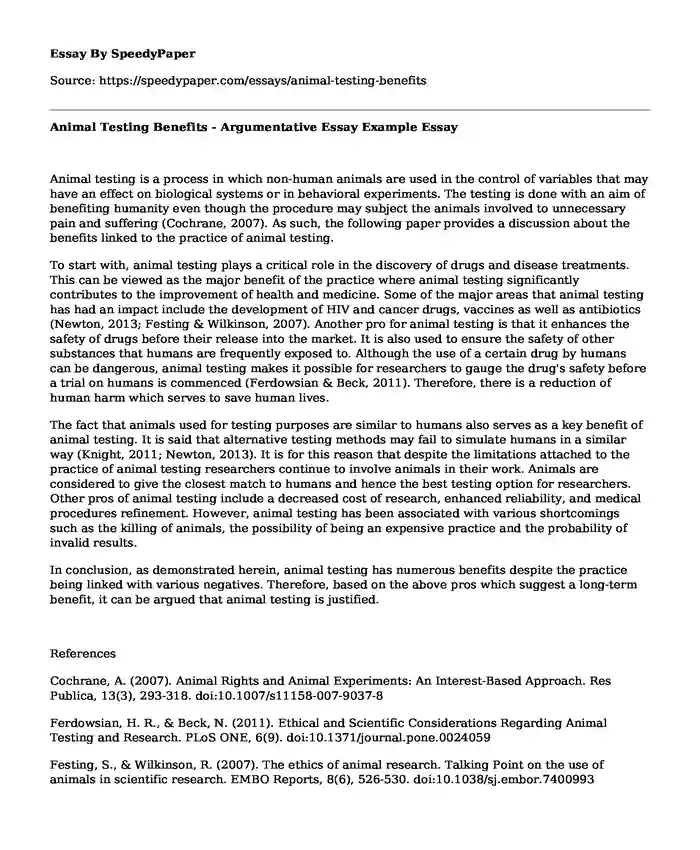Animal testing is a process in which non-human animals are used in the control of variables that may have an effect on biological systems or in behavioral experiments. The testing is done with an aim of benefiting humanity even though the procedure may subject the animals involved to unnecessary pain and suffering (Cochrane, 2007). As such, the following paper provides a discussion about the benefits linked to the practice of animal testing.
To start with, animal testing plays a critical role in the discovery of drugs and disease treatments. This can be viewed as the major benefit of the practice where animal testing significantly contributes to the improvement of health and medicine. Some of the major areas that animal testing has had an impact include the development of HIV and cancer drugs, vaccines as well as antibiotics (Newton, 2013; Festing & Wilkinson, 2007). Another pro for animal testing is that it enhances the safety of drugs before their release into the market. It is also used to ensure the safety of other substances that humans are frequently exposed to. Although the use of a certain drug by humans can be dangerous, animal testing makes it possible for researchers to gauge the drug's safety before a trial on humans is commenced (Ferdowsian & Beck, 2011). Therefore, there is a reduction of human harm which serves to save human lives.
The fact that animals used for testing purposes are similar to humans also serves as a key benefit of animal testing. It is said that alternative testing methods may fail to simulate humans in a similar way (Knight, 2011; Newton, 2013). It is for this reason that despite the limitations attached to the practice of animal testing researchers continue to involve animals in their work. Animals are considered to give the closest match to humans and hence the best testing option for researchers. Other pros of animal testing include a decreased cost of research, enhanced reliability, and medical procedures refinement. However, animal testing has been associated with various shortcomings such as the killing of animals, the possibility of being an expensive practice and the probability of invalid results.
In conclusion, as demonstrated herein, animal testing has numerous benefits despite the practice being linked with various negatives. Therefore, based on the above pros which suggest a long-term benefit, it can be argued that animal testing is justified.
References
Cochrane, A. (2007). Animal Rights and Animal Experiments: An Interest-Based Approach. Res Publica, 13(3), 293-318. doi:10.1007/s11158-007-9037-8
Ferdowsian, H. R., & Beck, N. (2011). Ethical and Scientific Considerations Regarding Animal Testing and Research. PLoS ONE, 6(9). doi:10.1371/journal.pone.0024059
Festing, S., & Wilkinson, R. (2007). The ethics of animal research. Talking Point on the use of animals in scientific research. EMBO Reports, 8(6), 526-530. doi:10.1038/sj.embor.7400993
Knight, A. (2011). The Costs and Benefits of Animal Experimentation. The Costs and Benefits of Animal Experiments, 179-193. doi:10.1057/9780230306417_12
Newton, D. E. (2013). The animal experimentation debate: A reference handbook. Santa Barbara, CA: ABC-CLIO, LLC.
Cite this page
Animal Testing Benefits - Argumentative Essay Example. (2022, May 17). Retrieved from https://speedypaper.net/essays/animal-testing-benefits
Request Removal
If you are the original author of this essay and no longer wish to have it published on the SpeedyPaper website, please click below to request its removal:
- Literary Essay Sample: Discussion on Character and Author Argument Development
- Free Paper: Effects of Drugs on Mental Health - Annotated Bibliography Example
- 1. The Introductory Paragraph
- Essay Example on Russian Mafia Versus Italian Mafia
- Essay Sample on Slavery and Freedom: The American Paradox by Edmund Morgan
- Nursing Course. Paper Example
- Free Essay on Endangered Species Extended Project
Popular categories





